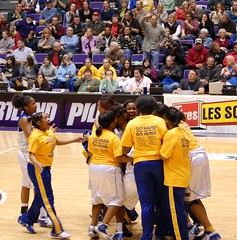Touring the Memorial Coliseum and Rose Garden
by Steve, October 12th, 2009As a member of the the mayor’s Rose Quarter Stakeholder Advisory Committee, I got the chance to tour the two-arena, 35 acre Rose Quarter with Blazers’ and city staff (and a bunch of media) this morning.
We got a good look at the inner workings of both arenas, starting with the Rose Garden. We were told of its awsomeness and flexibility, as well as recent upgrades to the club level and suites.
But PSU urban studies prof Will Macht couldn’t hide his disdain for the “very convoluted” design of the 20,000 seat arena. While the bowl has great sight lines and, yes, flexibility, the concourses, stairways, escalators, elevators and parking ramps convey a jumbled, confusing sense of place. In contrast, Macht praises the Coliseum for the way a very large space was kept so elegant and simple.
After an overview of the lands available for development (a small parcel on the south side, currently a grassy and tree-planted slope, and Broadway frontage the north end) we entered the old glass palace at the concourse level.
Besides antiquated lighting and mechanical systems and a backlog of deferred maintenance, the Coliseum suffers a handful of design shortcomings:
- No loading docks… the event floor was designed at street level to accommodate the Rose Festival Parade.
- The original ice floor (which is about 30 years beyond its design life) is 15 feet shorter than regulation and a couple feet too narrow.
- Because of the design of the free-standing bowl, there is nowhere to route ventilation shafts for concession stands, so food has to be cooked elsewhere and brought in.

The view from the Rose Garden club level, the one nice open space outside of the bowl itself, echoing the all-around clean lines of the Coliseum
But… The Coliseum booked about 150 events last year, the same as the Rose Garden. 450,000 people attended events at the Coliseum, in the worst economic climate since it was built, and with the prime tenant, the Winterhawks Hockey Club, having the worst attendance in their 30-plus year history.
At the end of the day, it is clear that without the Coliseum as a spectator facility, the city will lose a large number of bookings… the Rose Garden simply can’t accommodate them, especially given the two month blackout on bookings imposed by the NBA for potential playoff scheduling.
J. Isaac took questions after the tour, and began to talk about the need for an arena that seats 6-7,000 spectators, a figure rarely exceeded by Coliseum events. He talked vaguely about “shrinking the bowl” of the Coliseum to provide the more intimate environment common in major junior hockey and also to provide more “theatrical” flexibility for mid-sized shows.
My personal vision for the Coliseum has been also to reduce the number of seats, by installing a regulation ice sheet, luxury seating sections, and wider seats throughout. I asked Isaac if these were the kinds of things he had in mind. He told me he’s talking about physically changing the bowl, something that concerns me, and likely will concern preservationists. (The Coliseum’s listing the National Register of Historic Places cites both the glass curtain walls and the arena bowl as historically significant design elements.)
Isaac told me that Winterhawks management is interested in the concept of a smaller, refurbished arena to call home, with a small number of marquee games played at the Rose Garden.
Despite my concerns for the preservation of the bowl, I am very heartened that the Blazers and Winterhawks both appear to be on board with preserving the Coliseum as a multi-use spectator facility. It’s got fantastic bones and a truly remarkable and unique design — it’s the only fully-transparent arena in the world.
It is difficult to conceive of any “adaptive reuse” for the Coliseum that would serve anything close to half a million visitors a year. Portland has a demonstrated need for a mid-sized spectator venue, and we’ve got the bones of a great one in our hands. The only question remaining in my mind is who will pay for necessary renovations and upgrades, including mechanical systems, the ice floor and refrigeration plant, video system and seating reconfigurations. Isaac told me it won’t be the Blazers, and it is assumed that most money will have to come from private-public partnerships.
I pointed out to Isaac that the Winterhawks owner, Alberta oilman Bill Gallacher, might have a little bread to throw around, and he could have some incentive to invest in the joint if he could get different terms on his lease, maybe including a share of concessions, luxury seating, etc.
Isaac acknowledged that as a possibility, referencing the end of their lease in 2012.
“The Winterhawks are free agents in 2013,” he said.














